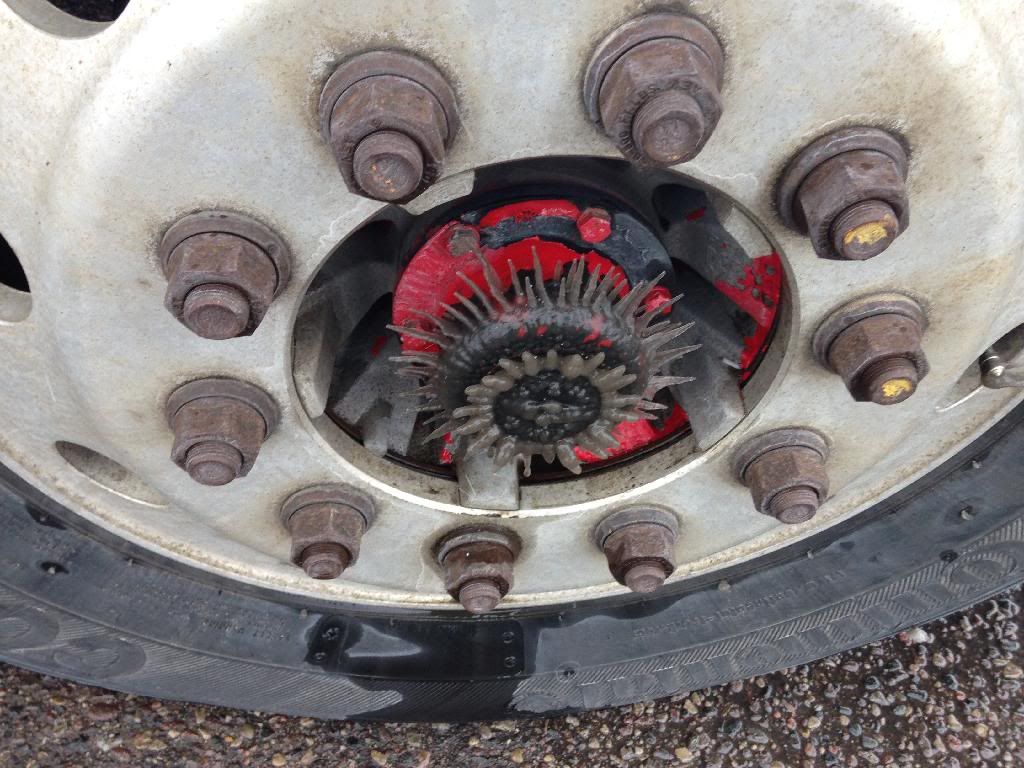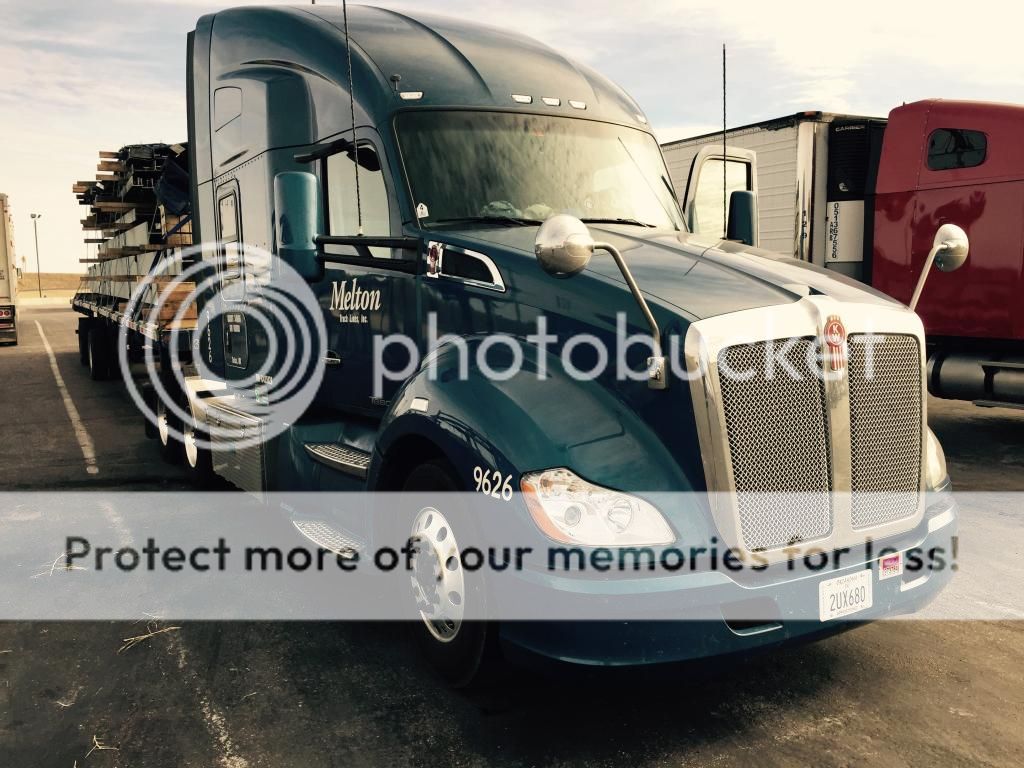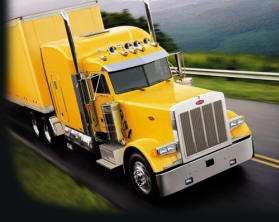Roehl Driver Training From Start To End.....
Topic 2938 | Page 17

WT ... dude, this was such an awesome thread, I couldn't stop reading it until I was done !!! lol
This should be mandatory reading for anyone getting into the industry. Perfect. Thank you so much for your time spent.
When you have a break, would you explain the different methods of getting paid?
So far I have gathered... Miles, tarp time and some sort of downtime waiting to unload.
...and why you decided to focus on flatbed , instead of dry van or reefer...
grazie, brother.... you are a gem :)
Wow. Really glad this is helping you guys and gals. There are different types of pay. I will try to explain them.
1. At Roehl you get paid 35 cent a mile loaded or empty starting out as a flatbed driver.
2. Tarp pay. You get $24 to put on a lumber tarp and another $24 to take the lumber tarps off. It takes 2 to 3 hours at least to completely tarp and untarp. Step tarps are smaller so you only get $12 on and $12 off.
3. Detention pay. You get detention pay if you arrive to a shipper or receiver before your appointment time. If you are late, you do not get detention pay no matter how long you are there. Detention pay starts two hours after your appointment time. Say you have a noon appointment to deliver. You got there at 1145. They have you wait to unload. At 1400, you start getting detention pay at $10 per hour.
4. Layover pay. Layover pay is paid if you are waiting to deliver. You have to be within 50 miles of the receiver. You may not be at a company terminal. You have to be 36 hours early. You get paid $60 for each day you have to wait. At 36 hours, you get $60 and then every 12 hours after that you get $30.
5. Weather pay. If you shut down because of iced roads for more than 24 hours because it was unsafe, they pay $60 a day I think.
6. Stop pay. I had a load last week. I loaded at one plant and went to another one and loaded again. That second loading was my first stop and I got paid an extra 25 bucks. It was farm equipment. I had to stop at 4 different places and unload one piece of equipment. Each stop I got $20 more.
There are a lot of ways to get paid. Most people do not read their company policy manual. Read it! Find every little way to make them pay you. It adds up. In reality, the best money is made only when the wheels are turning.
Shipper:
The customer who is shipping the freight. This is where the driver will pick up a load and then deliver it to the receiver or consignee.
Terminal:
A facility where trucking companies operate out of, or their "home base" if you will. A lot of major companies have multiple terminals around the country which usually consist of the main office building, a drop lot for trailers, and sometimes a repair shop and wash facilities.
Dry Van:
A trailer or truck that that requires no special attention, such as refrigeration, that hauls regular palletted, boxed, or floor-loaded freight. The most common type of trailer in trucking.Reefer:
A refrigerated trailer.
Winetaster,
Great thread...by the responses you have received you have a train full of interested followers. You have certainly caught the essence, in words, of your world, as a student and rookie driver. That takes talent and in your circumstances - extraordinary effort. If you choose to continue down this road you will certainly find that your train of followers will continue to grow as we wait with baited breath ;-) for the next installment. I wish you continued success on your journey!
Godspeed,
Randy
OOS:
When a violation by either a driver or company is confirmed, an out-of-service order removes either the driver or the vehicle from the roadway until the violation is corrected.

Winetaster,
Great thread...by the responses you have received you have a train full of interested followers. You have certainly caught the essence, in words, of your world, as a student and rookie driver. That takes talent and in your circumstances - extraordinary effort. If you choose to continue down this road you will certainly find that your train of followers will continue to grow as we wait with baited breath ;-) for the next installment. I wish you continued success on your journey!
Godspeed,
Randy
So true! Hope all is well for you WT. One of these days, when things slow down in the boat business, I'll give you a call/text to catch up. Until then, my friend!
Take care out there!
Tarren
OOS:
When a violation by either a driver or company is confirmed, an out-of-service order removes either the driver or the vehicle from the roadway until the violation is corrected.

Wow! You guys are too kind. I have been doing great. I rolled almost 12000 miles in the month of June. I am still learning every day. The other day I saw a driver folding his tarps on a low steel load. He folded them without pulling them to the ground. Today, I had a similar load and folded my tarps the way I saw. It worked great! So much to learn out here. School is a blur. It seems like it was years ago. It was only three months ago. I have had my frustrations but I am starting to really settle in now and enjoy what I do. It amazes me how many people follow this tread. It is an honor to inspire so many. Thank you for the kind words.

Hey WineTaster, what part of NC are you from? I'm down in Wilmington and also thinking about going with Roehl.

I am from the outer banks. They will not hire you from east of I-95. I had to get creative. My truck resides in Roanoke Rapids according to the company. I had to find a place to park and commute home.

Really? I talked to a Recruiter there about 2 weeks ago and got a pre-hire letter from them. I was going to call her on Monday and possibly set up an Orientation date. Since I got a pre-hire, does that mean they changed their policy or do I need to re-confirm that I would be hired?
Thanks! Josh
Pre-hire:
What Exactly Is A Pre-Hire Letter?
Pre-hire letters are acceptance letters from trucking companies to students, or even potential students, to verify placement. The trucking companies are saying in writing that the student, or potential student, appears to meet the company's minimum hiring requirements and is welcome to attend their orientation at the company’s expense once he or she graduates from truck driving school and has their CDL in hand.
We have an excellent article that will help you Understand The Pre-Hire Process.
A Pre-Hire Letter Is Not A Guarantee Of Employment
The people that receive a pre-hire letter are people who meet the company's minimum hiring requirements, but it is not an employment contract. It is an invitation to orientation, and the orientation itself is a prerequisite to employment.
During the orientation you will get a physical, drug screen, and background check done. These and other qualifications must be met before someone in orientation is officially hired.

Really? I talked to a Recruiter there about 2 weeks ago and got a pre-hire letter from them. I was going to call her on Monday and possibly set up an Orientation date. Since I got a pre-hire, does that mean they changed their policy or do I need to re-confirm that I would be hired?
Thanks! Josh
i think it depends on what division because when i talked to them they wont hire in the Norfolk area for anything but dry van for right now.
Dry Van:
A trailer or truck that that requires no special attention, such as refrigeration, that hauls regular palletted, boxed, or floor-loaded freight. The most common type of trailer in trucking.Pre-hire:
What Exactly Is A Pre-Hire Letter?
Pre-hire letters are acceptance letters from trucking companies to students, or even potential students, to verify placement. The trucking companies are saying in writing that the student, or potential student, appears to meet the company's minimum hiring requirements and is welcome to attend their orientation at the company’s expense once he or she graduates from truck driving school and has their CDL in hand.
We have an excellent article that will help you Understand The Pre-Hire Process.
A Pre-Hire Letter Is Not A Guarantee Of Employment
The people that receive a pre-hire letter are people who meet the company's minimum hiring requirements, but it is not an employment contract. It is an invitation to orientation, and the orientation itself is a prerequisite to employment.
During the orientation you will get a physical, drug screen, and background check done. These and other qualifications must be met before someone in orientation is officially hired.

Oh ok, the Recruiter mentioned dry van and flatbed. I was kind of hoping to do reefer , but I'm not trying to be too picky :-)
Dry Van:
A trailer or truck that that requires no special attention, such as refrigeration, that hauls regular palletted, boxed, or floor-loaded freight. The most common type of trailer in trucking.Reefer:
A refrigerated trailer.
New Reply:
New! Check out our help videos for a better understanding of our forum features

















Preview:
This topic has the following tags:
Roehl Transport CDL Training Choosing A Truck Driving School Choosing A Trucking Company Company Sponsored CDL Training Getting Your CDL On The Road In Training Reports From CDL Training Truck Driver Training







 TT On Facebook
TT On Facebook
Wow. Really glad this is helping you guys and gals. There are different types of pay. I will try to explain them.
1. At Roehl you get paid 35 cent a mile loaded or empty starting out as a flatbed driver.
2. Tarp pay. You get $24 to put on a lumber tarp and another $24 to take the lumber tarps off. It takes 2 to 3 hours at least to completely tarp and untarp. Step tarps are smaller so you only get $12 on and $12 off.
3. Detention pay. You get detention pay if you arrive to a shipper or receiver before your appointment time. If you are late, you do not get detention pay no matter how long you are there. Detention pay starts two hours after your appointment time. Say you have a noon appointment to deliver. You got there at 1145. They have you wait to unload. At 1400, you start getting detention pay at $10 per hour.
4. Layover pay. Layover pay is paid if you are waiting to deliver. You have to be within 50 miles of the receiver. You may not be at a company terminal. You have to be 36 hours early. You get paid $60 for each day you have to wait. At 36 hours, you get $60 and then every 12 hours after that you get $30.
5. Weather pay. If you shut down because of iced roads for more than 24 hours because it was unsafe, they pay $60 a day I think.
6. Stop pay. I had a load last week. I loaded at one plant and went to another one and loaded again. That second loading was my first stop and I got paid an extra 25 bucks. It was farm equipment. I had to stop at 4 different places and unload one piece of equipment. Each stop I got $20 more.
There are a lot of ways to get paid. Most people do not read their company policy manual. Read it! Find every little way to make them pay you. It adds up. In reality, the best money is made only when the wheels are turning.
Shipper:
The customer who is shipping the freight. This is where the driver will pick up a load and then deliver it to the receiver or consignee.
Terminal:
A facility where trucking companies operate out of, or their "home base" if you will. A lot of major companies have multiple terminals around the country which usually consist of the main office building, a drop lot for trailers, and sometimes a repair shop and wash facilities.
Dry Van:
A trailer or truck that that requires no special attention, such as refrigeration, that hauls regular palletted, boxed, or floor-loaded freight. The most common type of trailer in trucking.Reefer:
A refrigerated trailer.